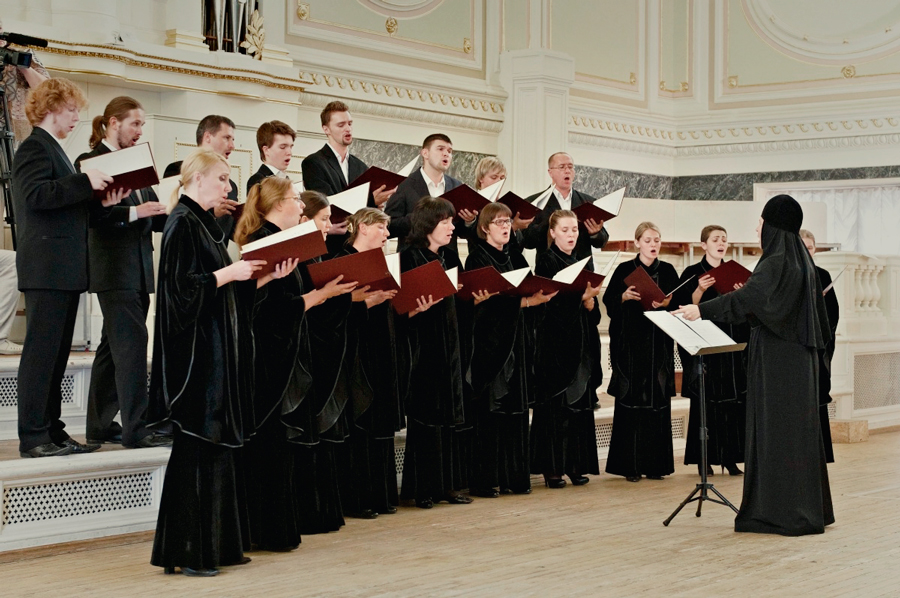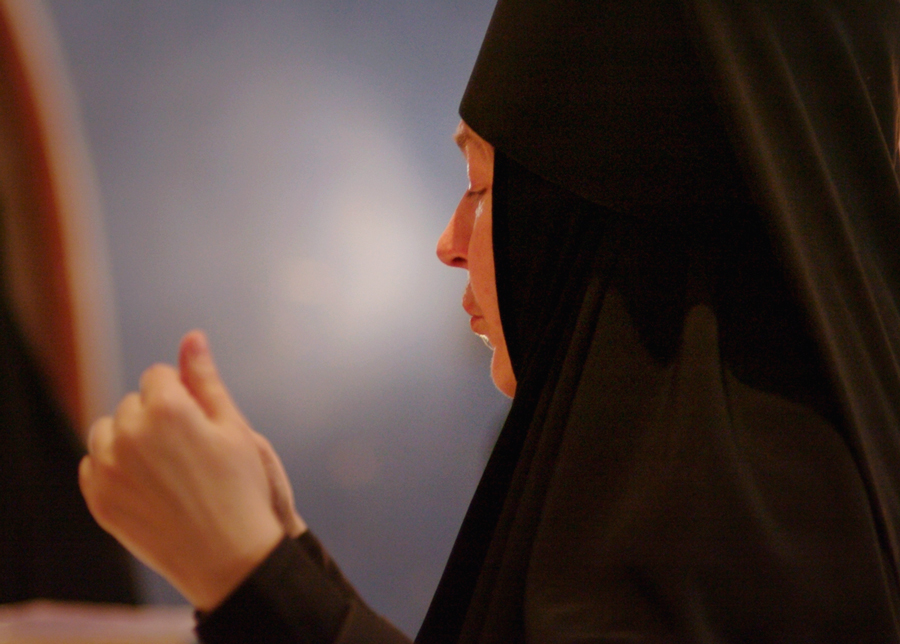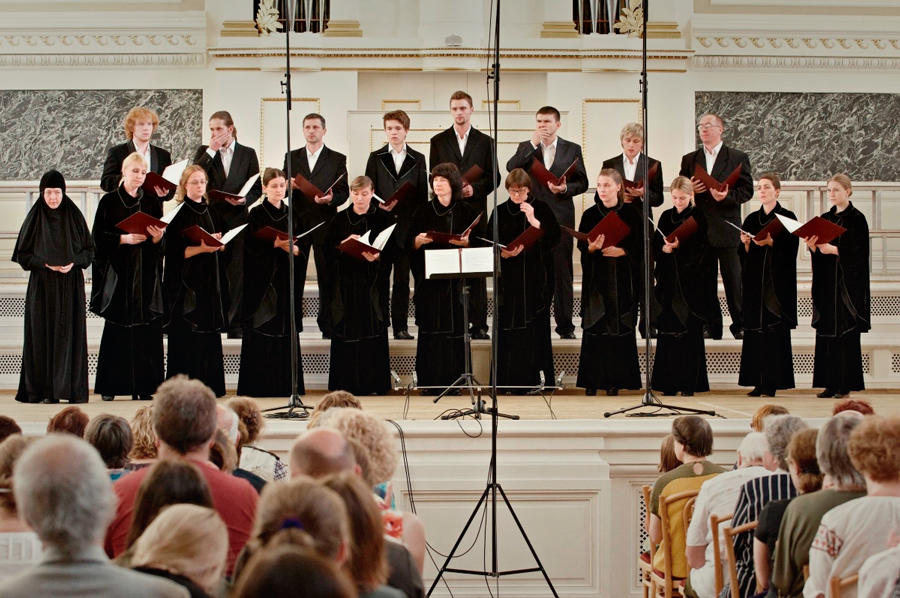
The Festive Choir of St Elisabeth Convent celebrates its 20th anniversary. It is a noteworthy date – a date to remember. There will be a concert to mark this anniversary. We also released a new disc titled Seek Ye God. This is why we decided to interview Nun Juliania (Denisova), the precentor of the Festive Choir, and ask her to tell our readers about the choir’s new songs, about creativity, about choir singing, and about music in general.
Mother Juliania, what is your take on the fact that there is too much music and songs in our lives, that they are so easily accessible, unlike in earlier ages… It seems that our civilisation has become too music-centred. Is it good or bad?
I’d say that our modern civilisation is a civilisation of background and commentary. This is what music and literature have evolved into…
Yes, the whole world keeps singing now, but what does it sing? Most often it’s nonsense and rubbish as far as its contents are concerned. However, people like listening to songs, even primitive ones, more than words…
Unfortunately, I can’t but agree. Nonetheless, not everything people play or sing is music. By the way, the word music is derived from the Greek word musikeia. A treatise written by Kornev in the 17th century puts it this way, “musikeia is for demonic songs and blasphemy.” On the other hand, church chants were referred to as ‘singing’. The division between secular and spiritual realms could not be more evident!

Later, the etymology of these words changed. Currently, it’s the other way around: music is something exalted and inspired. However, things that play in the background and make people suffer… Those poor people no longer know how great it is to go to a concert and to listen to live music without speakers or headphones! They are missing out on this pleasure. But what can we do if our world has grown to be this way…
Mother Juliania, let’s talk about music and songs written in order to be useful for the soul. I mean the new disc, aptly titled Seek Ye God.
This is a follow-up of God’s idea about music in the Church and how diverse it can be…
When I came to the Convent, literally two months later several nuns cornered me and said, “We have an idea about a new disc, and this idea received Father Andrew’s blessing. We would like to record pilgrims’ songs, and you will help us!” I did not know any of the pilgrim’s songs, except O Wondrous Isle of Valaam! Those songs appeared so primitive to me – I was a “professional musician”, after all. On the other hand, I had to do it because I was blessed to. So we prepared musical treatments, rehearsed these songs, and recorded a disc titled Shining Bright. Nun Joanna (Orlova) was in charge of the audio studio at that time, and the studio was thriving because the Internet wasn’t as ubiquitous as it is now and discs were in high demand. She came up with an idea to release more albums in this series – there are lots of pilgrims’ songs out there, you know. I wasn’t really happy with it because I thought it was a vanity of vanities and unfit for a monastic to deal with. However, Nun Joanna went to Father Andrew and asked him to give me spare time to write new songs, so that they could record the new album.
And that was how it happened. I remember it as vividly as if it were not long ago: it was in September, I wrote twelve pieces, and then some more, including You Simply Have to Love, Poor Brethren, O Wondrous Isle of Valaam, Faith Hope and Love, Rejoice O Bride Unwedded.

Did those songs have author music and treatment?
Yes, they did but I had to rewrite them for the choir. So I was entertaining this thought. By that time, we had already had recorded pieces where the choir was divided into two parts, with some chorists singing accompaniment, imitating a musical instrument (such as a guitar or a gusli), and the rest singing the words in parts. This idea was first realised in My Days, a song I wrote in 2002. Later we recorded other songs – Adam’s Lament, The Horse Song – in this style. I had this experience and that was why I decided to make a disc featuring two choirs: the Monastic Choir singing the tunes, and the Festive Choir singing the accompaniment. As a result, the album You Simply Have to Love was released. I didn’t expect it to be so successful. By that time, our sound engineers Konstantin Karmanov and Dmitry Korshakevich were so skilful that they managed to achieve amazing sound quality on this disc.
We went on singing during church services, and I wrote new harmonisations from time to time. I never forgot about songs, although I didn’t write to them. Sometimes a new tune would pop up in my mind, and I would begin to skim some pages and read poetry… I recall a moment when a sister said to me, “It seems you haven’t written anything for a long time, have you?” It was precisely the moment when a simple text fell into the fertile ground. I immediately wrote two songs: “Preserve, O Lord” and “I Live with God’s Help” with lyrics by Father Andrew Logvinov. It seems something inside me became ripe.
Creative people always have moments like these: you often don’t realise what is going on inside you, and it’s hard to explain. And then finally it gets down to three or four phrases and shoots off some overtones. Or sometimes a melody follows you everywhere you go and you don’t know what to make of it, so you begin looking for a text to use with it. That was what happened with my latest song: a tune came to me first, and then I made a Trisagion out of it.

You mean, in this case, you didn’t intend to write songs at all…
I’m trying to say that we did not have any idea about this album. We simply had a collection of new songs. People need this genre of paraliturgical, the quasi-worship songs. They want to hear songs rendered in a professional but soulful and prayerful manner, in an Orthodox style. We wanted to perform these songs in such a manner that it would be obvious that we are Orthodox…
…not Evangelicals?
Yes! Exactly! They keep singing about God all the time, and people listen to them. We have our own rich heritage, though.
The Internet became more widespread at that very time, and our album You Simply Have To Love and our choir literally soared to worldwide fame. We started doing more concerts and touring in more places. However, our choir isn’t the main source of income for any of our singers. They all work in other places. This is why it is impossible for us to do as many concerts as we could – and that’s great. We aren’t fond of concerts because this kind of activities most of the time leads to degradation, to getting used to cheering crowds, to success, and you sing worse and worse because you are fed up with all that…
Does the recording of a music album prevent this kind of temptations?
Yes, it does. I think I should finish my story on how this new album was created. As soon as we accumulated several new songs written specifically for the Festive Choir, we began thinking of recording the new album. And that was how we got down to this project…
Did the choir perform these songs prior to the recording?
Yes, it did. In fact, there wasn’t a single song that we composed specifically for the new album, unlike You Simply Have To Love album where we composed all songs specifically for the album and then they became popular. Here, on the contrary, all the songs were already being performed, even by other choirs, and only later did we record an album with them.
Two songs, namely, Oh Serbia The House of God and Lord My God Bless Thy People, were recorded directly for the album. They are tricky, with percussion, and Edward Lange together with Olga Vorobyova sing solo and imitate various instruments. These songs are in Serbian, and it took a lot of effort to cut and edit them. They are hard to perform live. We had already performed all other songs live and knew that people liked them.

The name of this album was taken from one of our latest songs. Last summer we went on a pilgrimage to Diveevo. We sang during the liturgy and prayed there. Andrei Zubrich, our soloist Marina’s husband, went with us. He is a professional composer who graduated from our lyceum and the Academy of Music was awarded the State Award and writes music for Yanka Kupala Theatre. He and his wife are devout believers and go to church regularly. So the Lord allowed him to find the following poem inscribed on the house of Pasha of Sarov:
Seek ye God, Seek with tears, Seek your Lord, While He hears.
Seek Him everywhere, Seek Him everyone, And you will find Him Somewhere, sometime.
Your joy will be Above the sky! Just seek him people Like beggar seeks a pie…
This small poem written by an unknown author inspired Andrei to compose a song. We sang Seek Ye God at a concert and we have always been singing it first thing during our concerts.
Does it mean that this song has become special for the choir?
Yes, we did not even have differing opinions about the name of the new album. At first, we planned to title it Keep O Lord. But as soon as Seek Ye Lord appeared, it was a clear favourite.
We wanted the choir to give out a clear message to its listeners. This composition by Andrei has become this shoutout and an epigraph to each concert and the album. When we stand on stage we don’t know who is sitting in the audience: they may have found God already. However, we want to approach those who haven’t found him yet, like professional musicians or artists who find it very difficult to turn to God because it is hard to suppress their selves, because they have a talent and want to show it off, unaware of the fact that everything they have belongs to God.
I keep saying in all my interviews that this choir over there on stage consists exclusively of professionals with excellent education who also sing in church, who are believers and who take communion. I say this because I want to make intellectuals think that faith is not something that old ladies, common folks, or those who suffer from diseases or dependencies do… There are alternative examples. God does not prevent them from leading a normal life; on the contrary, He helps them with it.
Was the release of the new album on the eve of the choir’s anniversary intended?
It was just a coincidence. Especially given that the album took a long time to record and release… We were reminded of the upcoming anniversary of our choir not long ago. We celebrate the choir’s birthday every year on February 23 for twenty years. This is not an anniversary, it’s just a nice-looking date.
Where did you record the tracks? In a church?
Yes. It is important for a sound engineer to record everything in one and the same place, with the same settings. A recording must be perceived as a single whole. A trained ear can hear it if tracks are recorded in different environments. We did our best to ensure the highest quality of our work from a composer’s or a performer’s or a sound engineer’s viewpoint.
So, the first album in the Pilgrim’s Songs series was recorded exclusively by the Monastic Choir. The second album featured a mix of the two choirs. This third album has a different quality because it features only the Festive Choir, except Keep O Lord which we performed together with the nuns, and this track certainly was to the album’s advantage.
What comes next, after all those years? Will there be more songs? What kind of choir will sing them?
After I composed several songs using lyrics by Father Andrew Logvinov and Hieromonk Roman, people started to send me their poems… I’m not a songwriter! If I happen to stumble upon a tune, I write it down, and then I don’t know where it should go, I simply feel the need to get it off my chest, give it away, and express it somehow. Of course, there are people who don’t expect to hear their music performed but this absence of demand is stressful and makes one anxious; it is hard to bear. A composer will always need someone to perform his or her music. I thank God for this choir that loves and supports my creative efforts. I’m really blessed… Yes, we plan to release Pilgrim’s Songs 4 in cooperation with the nuns. We have come to a decision to record one more album.
Interview by Helena Nasledysheva
Article from February 17, 2017